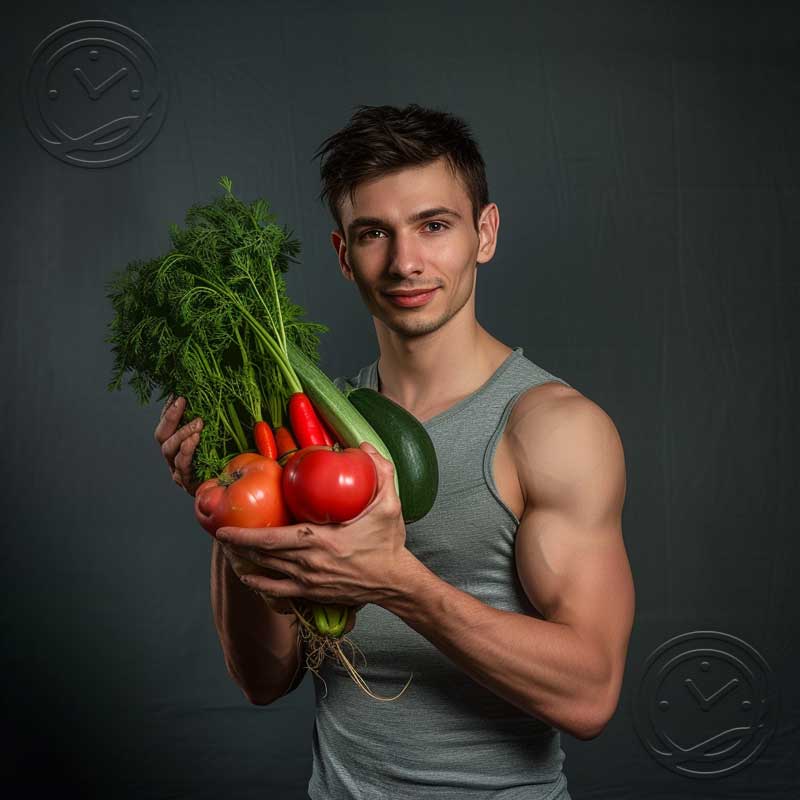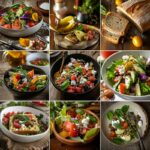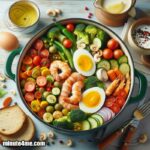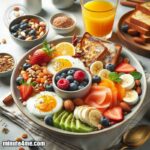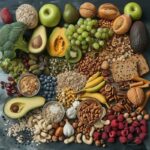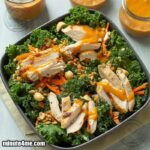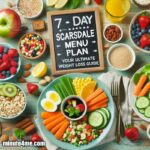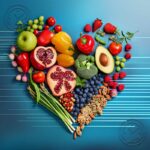Introduction
Embarking on a journey to build muscle as a vegan requires debunking the myth that animal protein is the only way to achieve significant muscle growth.
Plant-based diets can be just as effective for muscle gain, provided they are well-planned and nutritionally balanced.
The key is understanding how to optimize your intake of protein, alongside other essential nutrients, to support muscle repair and growth.
This guide will delve into the intricacies of crafting a vegan meal plan specifically tailored for muscle gain, integrating scientific knowledge with practical, everyday dietary choices.
Vegan Meal Plan for Muscle Gain
Designing a muscle-building vegan meal plan revolves around understanding the macronutrient composition – proteins, carbohydrates, and fats – and how they work synergistically to support muscle growth and overall health.
- Protein: Essential for muscle repair and growth, vegans must focus on incorporating a variety of protein-rich foods to meet their daily requirements.
- Carbohydrates: They fuel your workouts and assist in recovery. Opting for complex carbs provides sustained energy.
- Fats: Healthy fats are crucial for hormonal balance and nutrient absorption.
The key to success is not just about what you eat, but how you combine these nutrients in your daily meals.
Discover Mediterranean Diet Ideas that delve into the lively realm of Mediterranean cooking, renowned for its robust flavors and nutritional…
High-Protein Vegan Foods
A diverse range of high-protein vegan foods can meet and even exceed your protein requirements:
- Legumes: Including lentils, beans, and chickpeas, these are not just high in protein but also fiber, iron, and other micronutrients.
- Soy Products: Tofu, tempeh, and edamame are complete protein sources, meaning they contain all nine essential amino acids.
- Seitan: A wheat-based protein, it’s versatile in cooking and high in protein.
- Nuts and Seeds: Almonds, chia seeds, flaxseeds, and hemp seeds are not only protein-rich but also contain healthy fats and omega-3 fatty acids.
- Whole Grains: Quinoa and brown rice, while not as high in protein as legumes or soy products, are excellent complementary sources.
Incorporating a variety of these foods is crucial to ensure a complete amino acid profile and prevent nutritional deficiencies.
Balancing Macros for Muscle Growth
The balancing of macronutrients is a delicate art:
- Protein: Aim for 1.0-1.5 grams per pound of bodyweight. This can be adjusted based on individual goals and workout intensity.
- Carbohydrates: Should form a substantial part of your diet, especially on training days, to provide energy and aid in recovery.
- Fats: Often underrated in muscle-building, healthy fats are essential for optimal hormonal function and can aid in nutrient absorption.
A table to visualize the macronutrient distribution might look like this:
| Macronutrient | Role in Muscle Building | Suggested Intake |
|---|---|---|
| Protein | Muscle repair and growth | 1.0-1.5g/lb bodyweight |
| Carbohydrates | Energy and recovery | 45-65% of total calories |
| Fats | Hormonal health | 20-35% of total calories |
5 Dash Diet Dinner One-Pot Meals
Discover the effortless path to heart-healthy dining with 5 Dash Diet Dinner One-Pot Meals. Dive into a world where flavor…
Meal Timing and Portion Control
Timing and portion control are pivotal in a muscle-building diet:
- Meal Timing: Consuming protein-rich meals and snacks at regular intervals throughout the day ensures a constant supply of amino acids to the muscles, vital for repair and growth.
- Pre-Workout Meals: Focus on a balance of carbs and protein to fuel your workouts. A small, easily digestible meal 1-2 hours before exercising can optimize performance.
- Post-Workout Nutrition: This is critical for recovery. A combination of protein and carbohydrates within 30 minutes to an hour post-exercise can significantly aid in muscle repair.
Crafting Your Meal Plan
Creating a well-rounded vegan meal plan for muscle gain involves more than just piling on the protein.
It’s about finding the right balance between macronutrients, flavors, and meal timing to fuel your workouts and aid recovery.
Here’s a step-by-step guide to building your muscle-gain meal plan:
- Determine Your Caloric Needs: Calculate your total daily energy expenditure (TDEE) and add an appropriate calorie surplus for muscle gain.
- Balance Your Macros: Aim for a macronutrient ratio that supports muscle growth, such as 25-30% protein, 40-50% carbohydrates, and 30-35% fats.
- Plan Your Meals: Include a variety of protein sources, complex carbohydrates, and healthy fats in each meal.
- Prep in Advance: Vegan meal prep can be a game-changer, ensuring you have nutritious meals ready to go.
19 Low-Sugar DASH Diet Breakfast Recipes
Discover the secret to starting your day right with our collection of 19 Low-Sugar DASH Diet Breakfast Recipes! Delve into…
Breakfast Ideas for Vegan Bodybuilders
Breakfast is an opportunity to kickstart your day with a nutritious, protein-packed meal.
Here are some ideas:
- Tofu Scramble: Loaded with vegetables and spices for flavor. Serve with whole-grain toast for added carbs.
- Protein-Packed Oatmeal: Mix in vegan protein powder, nuts, and berries. Use plant-based milk for extra creaminess and protein.
- Vegan Yogurt and Granola: Choose a high-protein vegan yogurt, and top with homemade granola packed with nuts and seeds.
A sample breakfast table could look like this:
| Breakfast Option | Protein | Carbohydrates | Fats |
|---|---|---|---|
| Tofu Scramble | High | Medium | Low |
| Protein Oatmeal | High | High | Medium |
| Yogurt and Granola | Medium | High | High |
Lunch and Dinner
Lunch and dinner are crucial for replenishing energy stores and providing the body with nutrients for muscle repair.
Consider these options:
- Lentil and Quinoa Salad: A perfect blend of protein and complex carbs. Add a variety of veggies for micronutrients and fiber.
- Chickpea Stir-Fry: Use tofu or tempeh for an extra protein kick, and serve with brown rice or quinoa.
- Black Bean Burgers: Homemade for better nutrient control, served on a whole-grain bun with a side of sweet potato fries.
Here’s a breakdown of a typical lunch/dinner:
| Meal Option | Protein | Carbohydrates | Fats |
|---|---|---|---|
| Lentil Quinoa Salad | High | High | Medium |
| Chickpea Stir-Fry | High | High | Low |
| Black Bean Burgers | High | Medium | Medium |
Healthy Snack Ideas
Snacks are important for maintaining energy levels and providing a steady supply of nutrients throughout the day.
Some healthy snack options include:
- Fruit and Nut Butter: Apple slices or a banana with a dollop of almond or peanut butter.
- Hummus and Veggies: Carrots, bell peppers, and cucumbers dipped in homemade hummus.
- Protein Smoothies: Blend your favorite fruits with a scoop of plant-based protein powder and unsweetened almond milk.
A snack idea table:
| Snack Option | Protein | Carbohydrates | Fats |
|---|---|---|---|
| Fruit and Nut Butter | Medium | High | Medium |
| Hummus and Veggies | Medium | Low | Low |
| Protein Smoothie | High | Medium | Low |
By incorporating a mix of these breakfast, lunch, dinner, and snack ideas into your diet, you can create a delicious, varied, and nutritionally complete meal plan that supports your muscle-building goals on a vegan diet.
Remember to adjust portions and ingredients based on your individual caloric and macronutrient needs.
Supplements and Hydration
In the realm of vegan bodybuilding, supplements can play a crucial role in filling nutritional gaps while hydration maintains overall health and workout performance.
Understanding the importance of both can significantly impact your muscle-building journey.
Vegan Supplements for Muscle Building
While a well-planned vegan diet can provide most of the necessary nutrients, certain supplements may be beneficial:
- Vitamin B12: Crucial for energy production, B12 is primarily found in animal products, making supplementation important for vegans.
- Iron: Essential for oxygen transport in the blood, plant-based iron is less absorbable, so supplementing may be necessary, especially for women.
- Creatine: While not essential, creatine supplements can enhance muscle strength and endurance, benefiting high-intensity workouts.
- Omega-3 Fatty Acids: Plant-based sources like flaxseed and chia seeds are rich in ALA, but vegan DHA and EPA supplements can be beneficial for optimal health.
- Protein Powders: A convenient way to ensure adequate protein intake, especially post-workout. Look for blends of different plant proteins to get a complete amino acid profile.
A table for quick reference:
| Supplement | Purpose | Recommended for Vegans |
|---|---|---|
| Vitamin B12 | Energy production | Essential |
| Iron | Oxygen transport | Often Necessary |
| Creatine | Muscle strength & endurance | Beneficial |
| Omega-3 Fatty Acids | Heart and brain health | Beneficial |
| Protein Powders | Muscle repair & growth | Beneficial |
Exercise and Recovery
Exercise and recovery are pivotal in any muscle-building regimen.
For vegan bodybuilders, this might require specific considerations to align with their dietary choices.
Workout Strategies for Vegans
Vegans can follow similar workout regimens as non-vegans, but there might be a need for slight adjustments:
- Strength Training: Focus on compound movements like squats, deadlifts, and bench presses to engage multiple muscle groups.
- Endurance Training: Incorporate cardio sessions to improve heart health and endurance, which can also aid in muscle recovery.
- Flexibility and Balance: Yoga or Pilates can enhance flexibility, reducing the risk of injury.
- Listening to Your Body: Adjust intensity based on energy levels. Vegan diets can be high in fiber, which might affect energy during workouts.
Rest and Recovery
Recovery is just as important as the workout itself:
- Adequate Sleep: Aim for 7-9 hours of quality sleep per night for optimal muscle recovery.
- Post-Workout Nutrition: A blend of protein and carbs post-workout can aid in quicker muscle recovery.
- Active Recovery: Gentle activities like walking or light yoga can help in muscle recovery on rest days.
Final Thoughts
Maximizing muscle gain as a vegan bodybuilder requires dedication, a well-structured diet, and an effective workout plan.
Regularly evaluate and adjust your diet and training regimen to align with your evolving goals.
Be mindful of the need for adequate supplements and proper hydration to support your bodybuilding journey.
Remember, individual needs can vary significantly, so it’s important to listen to your body and adapt as necessary.
With the right approach, vegan muscle building can be just as effective, if not more so, than traditional diets.
